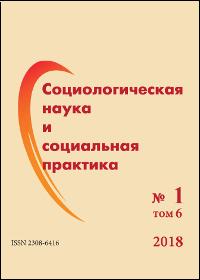Специфика группы пожилых как объекта социальной политики
Аннотация
Литература
Доброхлеб В.Г. Ресурсный потенциал пожилого населения России // Социологические исследования. 2008. № 8. С. 55–61.
Дудченко О.Н., Мытиль А.В. Как живётся пожилым москвичам (социально-психологическое исследование, 2014) // Третий возраст – энергия и опыт / Под ред. Э.Е. Чугуновой. М.: Акварель, 2015. С. 9–18.
Елютина М.Э., Смирнова Т.В. Геронтологическая составляющая кадровой работы современного руководителя // Социологические исследования. 2006. № 3. С. 6–21.
Елютина М.Э. Супружеские отношения в пожилом возрасте // Социологические исследования. 2010. № 11. С. 83-92.
Калькова В.Л. Старость: Реферативный обзор [Электронный ресурс] // URL: http://development2005.narod.ru/books/kalkova.htm (Дата обращения: 29.12.2017).
Козырева П.М., Низамова А.Э., Смирнов А. И. Здоровье населения России: динамика и возрастные особенности (1994–2011 гг.) // Вестник Института социологии. 2013. № 6. С. 8–47.
Козырева П.М., Смирнов А.И. Российские пенсионеры в условиях кризиса // Социологические исследования. 2017. № 1 (393). С. 64–73.
Красильникова М.Д. Люди старшего возраста – новые возможности или ещё одно ограничение // Вестник общественного мнения. 2008. № 5 (97). С. 9–18.
Левинсон А. Институт старости [Электронный ресурс] // Отечественные записки. Электронный журнал. 2005. № 3 (24). URL: http://www.strana-oz.ru/2005/3/starost-kak-institut (Дата обращения: 29.12.2017).
Малева Т.М., Синявская О.В. Повышение пенсионного возраста: pro et contra // Журнал новой экономической ассоциации. 2010. № 8 (8). С. 117–137.
Мытиль А.В., Дудченко О.Н. Проблема социальной инклюзии и трудовой занятости пожилых людей: ресурсы и риски // Труд и общество в реалиях XXI века: Сб. науч. статей / Отв. ред. Р.В. Карапетян. СПб.: Скифия-принт, 2017. С. 905–915.
Неработающие пенсионеры о жизни на пенсии. [Электронный ресурс]: ФОМ [веб-сайт]. Электрон. дан. 24.01.2014: URL: http://fom.ru/Obraz-zhizni/11310. (Дата обращения: 29.12.2017).
Павлова И.А., Гуменников И.В., Монастырный Е.А. Международные интегральные индексы как сравнительные методики макроуровня в оценке благополучия пожилого населения // Вестник науки Сибири. 2017. № 1 (24). С. 47–66.
Писарев А.В. Образ пожилых в современной России // Социологические исследования. 2004. № 4. С. 51–56.
Полтерович В.М. Общество и реформы. Институциональные ловушки: есть ли выход? // Общественные науки и современность. 2004. № 3. С. 5–16.
Примако Л. Пожилые люди в России: проблема социальной напряжённости // Вестник общественного мнения. 2010. № 2 (101). С. 101–112.
Распоряжение Правительства РФ от 05.02.2016 № 164-р «Об утверждении Стратегии действий в интересах граждан старшего поколения в Российской Федерации до 2025 года» [Электронный ресурс]: КонсультантПлюс [веб-сайт]. Электрон. дан. URL: http://www.consultant.ru/document/cons_doc_LAW_193464/ (Дата обращения: 29.12.2017).
Росстат. Демографический прогноз до 2035 года [Электронный ресурс]: Росстат [веб-сайт]. Электрон. дан. URL: http://www.gks.ru/wps/wcm/connect/rosstat_main/rosstat/ru/statistics/population/demography/# (Дата обращения: 28.06.2017).
Старшее поколение и будущее / [Н.М. Римашевская и др.]; под ред. Н.М. Римашевской. М.: Экономическое образование, 2014. 221 с.
Смирнов А.Т. Низкая рождаемость и старение населения: причины, последствия, варианты политики // Прогнозис. 2004. № 1. С. 185–198.
Смирнова Т.В. Пожилые люди: стереотипный образ и социальная дистанция // Социологические исследования. 2008. № 8. С. 49–55.
Старшее поколение москвичей: качество жизни и условия для активного долголетия / [Н.М. Римашевская, В.Г. Доброхлеб, О.Н. Дудченко и др.]; под ред. Е.А. Савостиной; АНО Совет по вопросам управления и развития. Москва: ООО Деловые и юридические услуги “ЛексПраксис”, 2015. 74 с.
Стенографический отчёт о заседании президиума Государственного совета «О развитии системы социальной защиты граждан пожилого возраста». [Электронный ресурс]: Президент России [веб-сайт]. Электрон. дан. 5 августа 2014 года. Воронеж. URL: http://www.kremlin.ru/events/president/news/46397 (Дата обращения: 29.12.2017).
Холостова Е.И. Социальная работа с пожилыми людьми. Учебное пособие. 2-е изд. М: Дашков и Кº. 2003. 296 с.
Четвернина Т.Я. Пожилые работники на российском рынке труда: уязвимость положения и формы дискриминации // Гендерное равенство: поиски решения старых проблем. М.: МОТ, 2003. С. 112–128.
Щанина Е.В. Организация досуга пожилых людей // Известия высших учебных заведений. Поволжский регион. Общественные науки. 2013. № 4 (28). С. 149–157.
Global, regional, and national disability-adjusted life years (DALYs) for 306 diseases and injuries and healthy life expectancy (HALE) for 188 countries, 1990–2013: quantifying the epidemiological transition // The Lancet. Vol. 386. № 10009. Р. 2145–2191. DOI: 10.1016/S0140-6736(15)61340-х.
The Global AgeWatch [веб-сайт]. URL: http://www.helpage.org/global-agewatch/ (Дата обращения: 05.06.2017).








 Издатель: Федеральное государственное бюджетное учреждение науки
Издатель: Федеральное государственное бюджетное учреждение науки